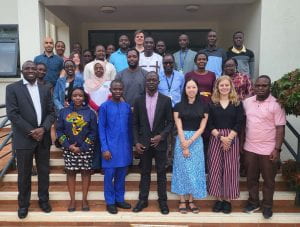
In July 2023 a group of researchers from IEU travelled to Entebbe, Uganda to deliver a short course on genome-wide association analyses and Mendelian randomization. Amanda Chong shares a glimpse of what happened during the week.
What were you doing and how did it come about?
The Mendelian randomization (MR) short course in Uganda came about as part of a capacity building objective of a MRC Cross-Ancestry Network project. This ongoing project includes large international data sources from UK Biobank, Ugandan Genome Resource, China Kadoorie Biobank, and the Mexico City Prospective Study. It is a collaboration between the MRC IEU at the University of Bristol, the MRC Population Health Research Unit at the University of Oxford and the MRC/UVRI & LSHTM Uganda Research Unit. Our Ugandan collaborators are growing an important resource of genetic data to complement an existing epidemiological cohort.
The purpose of the short course was to share knowledge of genome-wide association analyses (GWAS) and Mendelian randomization. The course aimed to empower the team there with skills and expertise to conduct genetic epidemiological research on their and other emerging African genetic data resources. We were also keen to create and foster collaborations.
Who were the tutors and participants?
We were very fortunate to have a great team of tutors from the MRC IEU. These included Professor Gibran Hemani, Dr Venexia Walker, Dr Lucy Goudswaard, Dr David Hughes, Dr Amanda Chong, and our IEU PhD visitor Christopher Kintu from Makerere University in Uganda.
We were delighted to have a lot of interest in the course with over 60 applicants. We shortlisted the applicants to 30 participants, predominantly from the MRC Uganda Unit and Makerere University as well as several participants from other universities in Kenya, Nigeria, and Namibia.
How did you develop the course?
The overall objective of the short course was to provide the participants with the confidence to conduct genome-wide association analyses and Mendelian randomization themselves so that they could apply these approaches in their own research. We therefore had several intended learning outcomes that would be addressed in the short course:
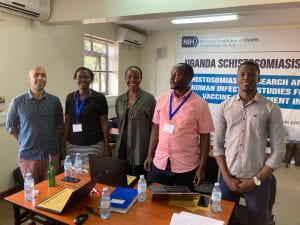 Discuss the core objectives of genome wide association studies and critically evaluate this study design.
Discuss the core objectives of genome wide association studies and critically evaluate this study design.- Discuss the strengths and limitations of genome-wide association studies.
- Perform genome wide association studies on large scale population genetic data.
- Interpret genetic associations using a range of bioinformatic tools.
- Discuss the limitations of observational epidemiology and strengths of causal inference. approaches such as Mendelian randomization.
- Discuss the different types of study designs in Mendelian randomization.
- Discuss the importance of data harmonization in two-sample Mendelian randomization.
- Perform one- and two-sample Mendelian randomization.
- Interpret Mendelian randomization findings.
- Discuss the limitations of two-sample Mendelian randomization.
- Discuss the applications of Mendelian randomization.
Furthermore, in the initial planning stages of the course we were guided by the feedback from organisers and participants of the November 2022 MR short course in Kenya. In particular, participants from the Kenya course reflected that they would have liked to have had more examples of studies that had used participants from continental Africa, and practicals that were more aligned with the research interests of the participants. We took this feedback on board when structuring the course to include:
- Revised lectures that included examples from African studies and practicals that applied data from the African cohort, Ugandan Genome Resource, where possible;
- An MR Hackathon that would allow the participants to conduct MR on a research topic that was of interest to them;
- Guest speakers: We welcomed Professor Segun Fatumo, who has led numerous genetic studies using African data, and Dr Sarah Atkinson, who has conducted MR research on malaria and iron deficiency using several continental African data sources. We were also delighted to have Christopher Kintu, a previous visiting PhD student to the IEU and a previous participant at the Kenya MR course, give a lecture on ‘Drug targets and cross-ancestry MR’. It was wonderful to see the journey of how Chris had applied to knowledge and skills learnt in Kenya to his PhD project and was now teaching these skills to his colleagues.
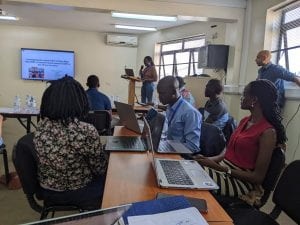 In addition, when designing our lectures and practicals we wanted to highlight to the participants some of the technical nuances and current challenges that can arise when using African data in comparison to data from other demographic groups.
In addition, when designing our lectures and practicals we wanted to highlight to the participants some of the technical nuances and current challenges that can arise when using African data in comparison to data from other demographic groups.
In particular, the current landscape of genetic studies from continental Africa are limited as many cohorts do not have the available resources to perform genotyping. When genotype and phenotype data are available from the few continental African data sources, sample sizes are generally small (~7,000 individuals) with a high percentage of relatedness and rare variants. Therefore, considerations must be taken when conducting a genome-wide association analyses to choose an appropriate analytical package.
Furthermore, when conducting MR analyses, these studies typically use GWASs performed in African American populations and findings may not be generalisable to continental African populations. When continental African GWASs are applied in MR analyses, the relatively small sample sizes of these GWAS studies can affect the statistical power of the MR analyses, resulting in imprecise findings.
In summary, the overall short course structure included:
- Basic statistical concepts for MR and GWAS
- Genome-wide association studies using the Ugandan Genome Resource
- Mendelian randomization using the Ugandan Genome Resource and other datasets, with a focus on two-sample MR
- Applications of MR – e.g., Drug repurposing, comparing effects across ancestries, etc.
- Incorporating non-African data to supplement the Ugandan Genome Resource examples
- MR Hackathon
How was the course received?
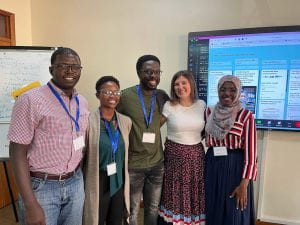
Overall, throughout the short course the participants were very engaged, energetic and eager to learn. They asked many insightful questions that sparked numerous discussions between tutors and participants.
We were also very grateful to receive positive comments from participants:
“Great flow of the content and the team was highly knowledgeable”
“I just wanted to thank tutors for conducting such an informative and engaging course. Your knowledge and expertise really helped us learn and grow in MR method.”
“I benefited a lot from the training however would have been happier if it took like 2 weeks, allowing for more understanding, discussion, exercises and question sessions (like questions by the tutors and also to the class) in my opinion. This would have enhanced our understanding, making us think more and grasp concepts deeper. Thank you for dedicating your time, I shall continue learning”
What have you all learnt from doing the course, and what have you enjoyed?
Through the organisation and execution of this short course, we learnt many valuable lessons that can be shared to colleagues who may be organising similar courses in the future.
In terms of organisation, understanding our target audience was an important factor in how we shaped our course material. We considered several components including:
- What was each participants’ educational background and what foundation did they have in terms of basic statistical and epidemiological knowledge;
- What were the research topics that are of interest to them;
- What technical questions and challenges could we highlight to help them when they conduct their own research;
- How many tutors were required to effectively conduct the course.
In addition, we had to plan for the type of setting that this course would be conducted. For example, we had to determine the strength and capabilities of the Wi-Fi in order to download R packages and access Posit Cloud, whether they had access to high performance computing systems, and whether they would all have access to a laptop during the course.
In terms of conducting the course, it was valuable to create contingency plans for the practical sessions. We were advised to take several USBs with the course material uploaded onto them to share if anyone was having any issues with accessing the data. This proved very useful as this issue did arise. In addition, asking participants to download all the necessary software and packages well ahead of the course commencing was also important as the Wi-Fi was poor in the course venue to download the required R packages during the sessions. This approach was particularly useful and may be useful learning for other IEU researchers running courses even when they do not expect there to be any connectivity issues.
Overall, one of the most enjoyable aspects of the course was interacting with the participants and their enthusiasm to engage with the course through their insightful questions and discussions. It was a pleasure to see them apply the concepts and skills they learnt throughout the week in the MR Hackathon and present their findings to the class.
Outside of the course, colleagues from the MRC Uganda Unit kindly organised a boat tour around Lake Victoria and a tour to explore Kampala.
What happens next?
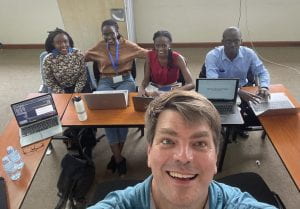 It was wonderful that many participants expressed interest in keeping in touch with the tutors and potentially collaborating with colleagues at the IEU. In particular, the implementation of the MR Hackathon has led to Professor Gibran Hemani’s group writing up their findings from this activity into a paper to be published on the relative influences across different ancestral groups of molecular factors for major depressive disorder. In addition, several participants are meeting with Amanda Chong on a fortnightly basis to go through course material.
It was wonderful that many participants expressed interest in keeping in touch with the tutors and potentially collaborating with colleagues at the IEU. In particular, the implementation of the MR Hackathon has led to Professor Gibran Hemani’s group writing up their findings from this activity into a paper to be published on the relative influences across different ancestral groups of molecular factors for major depressive disorder. In addition, several participants are meeting with Amanda Chong on a fortnightly basis to go through course material.
Furthermore, this short course has been a great opportunity for Professor Gibran Hemani and Amanda Chong to foster their collaboration with Professor Segun Fatumo and Christopher Kintu who are part of the MRC Cross-Ancestry Network project.
For more information, please contact Amanda Chong (a.chong@bristol.ac.uk).
